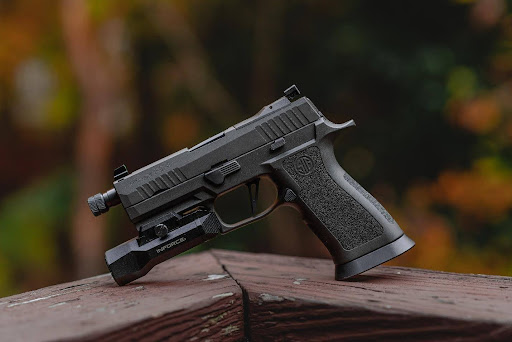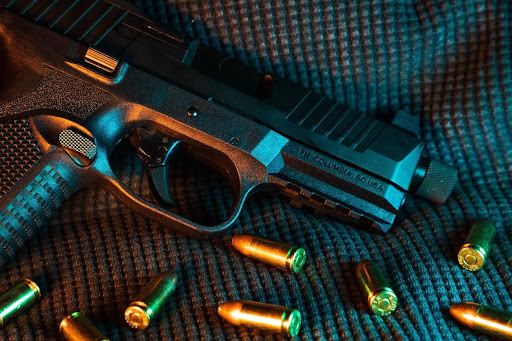






-

-
-
Maggie GeorgeRated by Super Lawyers
loading ...
Gun Crimes Attorney For Violent & Non-Violent Weapons Offenses
In the United States, firearm ownership and usage has a long history dating back to the original settlement of the New World by European explorers. Codified in the Bill of Rights, the Second Amendment grants the right to bear arms to the citizens of this country, something truly unique in the Western world. However, each individual state is responsible for the creation and enforcement of rules, laws and regulations surrounding the ownership, possession and use of firearms within their own borders.
Like any other state, Michigan has a multitude of firearms laws on the books that have been created by the legislature since the state was founded in 1837. While Michigan has relatively strong gun rights, they are not without limits. It is therefore important that anyone who owns, uses or is involved with firearms in any manner understand the laws and regulations surrounding them.
This is especially important for individuals who may be facing weapons charges. Accusations and criminal charges for illegal firearm possession or use are very serious, with a conviction having the potential to have life altering consequences. Due to the complex nature of firearms laws, it is strongly advised to work directly with a criminal defense attorney specializing in this area of law in order to ensure the best outcome possible under the circumstances.
Michigan Gun Laws

While the state’s firearms laws are indeed complex, they are also clearly spelled out with well defined penalties. While there are many different types of firearms offenses one can be charged with in Michigan, below are some of the most common:
- Illegal CCW (Carrying Concealed Weapon)
- Possession of a firearm by a convicted felon
- Illegal possession of unregistered NFA (National Firearms Act) weapons, such as short barreled firearms with a shoulder stock and machine guns
- Being in possession of a firearm during the commission of a felony
- Carrying a firearm in a prohibited place, such as a sports area, school, etc.
Penalties for Illegal Gun Offenses in Michigan
As with the laws regulating firearms possession and use, the penalties outlined in Michigan’s Penal Code are extensive and complex. This is made even more complicated by the possibility of federal firearms charges being involved as well. Because of this spiderweb of firearms laws at both the state and federal levels, it is critical for Michiganders to fully understand the very real possibility of a conviction resulting in life altering consequences. Those found guilty of state or federal firearms violations within Michigan should expect:
- Considerable jail or prison time
- Long-term or even permanent inability to legally own a firearm
- Abnormally high court costs and fines compared to similar level non-firearm offenses
- Loss of professional licenses, such as a doctors medical license
- Permanent criminal record that will hamper future job and housing opportunities
- Creation of issues for those in possession of green cards or visas, resulting in the revocation of these privileges or even possible deportation
Specific Michigan Gun & Weapons Offenses
Manufacture, Sale, Or Possession Of Illegal Weapons – MCL Section 750.224
 Section 750.224 makes it illegal to manufacture, sell, offer for sale, or possess specific weapons and devices. These include automatic firearms, mufflers and silencers, explosive devices, certain hand weapons like blackjacks and metallic knuckles, and disabling devices intended to incapacitate a person. The law classifies this offense as a felony, with penalties for conviction including up to 5 years in prison, a fine of up to $2,500, or both. However, there are exceptions for self-defense sprays and foams, government contractors working under U.S. government contracts, and licensed individuals.
Section 750.224 makes it illegal to manufacture, sell, offer for sale, or possess specific weapons and devices. These include automatic firearms, mufflers and silencers, explosive devices, certain hand weapons like blackjacks and metallic knuckles, and disabling devices intended to incapacitate a person. The law classifies this offense as a felony, with penalties for conviction including up to 5 years in prison, a fine of up to $2,500, or both. However, there are exceptions for self-defense sprays and foams, government contractors working under U.S. government contracts, and licensed individuals.
Possession Of A Firearm By A Felon In Michigan – MCL Section 750.224f
Section 750.224f states that anyone who has been convicted of a felony is banned from using, possessing, selling, transporting, purchasing, shipping, carrying, distributing, or receiving any firearm or ammunition. This prohibition is in effect for three years after the individual has paid all fines related to their felony, served all imprisonment terms, and completed any probation or parole conditions. For those convicted of certain felonies, which typically include violent or drug-related offenses, illegal firearm possession, and certain burglary or arson crimes, this gun prohibition extends to five years under similar conditions. This felony offense can result in up to five years of imprisonment, a fine of up to $5,000, or both.
Carrying A Firearm Or Weapon With Unlawful Intent – MCL Section 750.226
Section 750.226 makes it illegal to carry a firearm or certain other weapons with the intention of using them unlawfully against another person. This law covers a variety of weapons including pistols, pneumatic guns, knives with blades longer than 3 inches, daggers, dirks, razors, stilettos, and any other dangerous or deadly weapon or instrument. The critical factor in this law is the intent behind carrying these weapons; it specifically targets situations where an individual carries a weapon with the purpose to use it unlawfully against someone else. A violation is a felony offense. The penalty for those found guilty includes a prison sentence of up to 5 years and a fine of up to $2,500.
Carrying Certain Concealed Weapons In Michigan – MCL Section 750.227
Section 750.227 prohibits the carrying of specific types of concealed weapons. This includes daggers, dirks, stilettos, and other dangerous weapons, although there is an exception for hunting knives used for hunting purposes. The law also forbids carrying a concealed pistol on your body or in a vehicle without a proper license, and even with a license, specific restrictions must be followed. These prohibitions do not apply when the individual is in their own house, place of business, or on land they own. Penalties for this felony offense include imprisonment for up to five years and/or a fine of up to $2,500.
Possession Of A Firearm During A Felony – MCL Section 750.227b
Section 750.227b addresses the offense of carrying or possessing a firearm during the commission or attempted commission of a felony. This law creates a separate felony charge for anyone found in possession of a firearm under these circumstances, separate from the primary felony being committed. The law has a tiered punishment system for this offense: a first-time offender faces a mandatory imprisonment of 2 years; a second conviction results in a mandatory imprisonment of 5 years; and for a third or subsequent conviction, the imprisonment period increases to 10 years. It is important to note that these prison terms are served consecutively to any sentence for the primary felony. Additionally, these imprisonment terms cannot be suspended, and the individual is not eligible for parole or probation during this mandatory term.
Unlawful Firearm Transportation – MCL Section 750.227d
 Under Michigan Compiled Laws Section 750.227d, it is illegal to transport or possess a firearm (other than a pistol) in a vehicle unless the firearm is unloaded and either disassembled, enclosed in a case, carried in the trunk, or stored in a manner that makes it inaccessible from inside the vehicle. This law applies to all motor vehicles designed for land travel. The same rules also apply to pneumatic guns that expel a metallic pellet or BB larger than .177 caliber. These guns must be unloaded and either taken down, enclosed in a case, carried in the trunk, or stored in an inaccessible manner inside the vehicle. Violating this law is considered a misdemeanor offense, with penalties including imprisonment for up to 90 days and/or a fine of up to $100.00.
Under Michigan Compiled Laws Section 750.227d, it is illegal to transport or possess a firearm (other than a pistol) in a vehicle unless the firearm is unloaded and either disassembled, enclosed in a case, carried in the trunk, or stored in a manner that makes it inaccessible from inside the vehicle. This law applies to all motor vehicles designed for land travel. The same rules also apply to pneumatic guns that expel a metallic pellet or BB larger than .177 caliber. These guns must be unloaded and either taken down, enclosed in a case, carried in the trunk, or stored in an inaccessible manner inside the vehicle. Violating this law is considered a misdemeanor offense, with penalties including imprisonment for up to 90 days and/or a fine of up to $100.00.
Altering, Removing Identifying Marks On Firearms – MCL Section 750.230
Section 750.230 says that it is a felony offense to willfully alter, remove, or obliterate the name of the maker, model, manufacturer’s number, or other identifying marks on a pistol or other firearm. This law targets actions that make it difficult to trace the origin or ownership of a firearm, which is important for law enforcement and safety purposes. If an individual is found guilty of this felony, they may face imprisonment for up to two years and a fine of up to $1,000.
Possession Of Short-Barreled Shotgun Or Rifle – MCL 750.224b
According to MCL 750.224b, it is an offense to manufacture, make, possess, or transfer a shotgun or rifle that is short-barreled. The classification of this offense is a felony, and for those found in violation, the penalty can include imprisonment for up to five years, a fine of up to $2,500, or both. It’s important to note, however, that this law does not apply to firearms that are lawfully manufactured, made, possessed, or transferred under federal law.
Pointing Or Aiming A Firearm At Another Person – MCL Section 750.233
Under Section 750.233, it is considered a misdemeanor offense for a person to intentionally, but without malicious intent, point or aim a firearm at or toward another individual. This law emphasizes that even if there is no intent to harm or threaten, the act of merely pointing or aiming a firearm at someone is still a punishable offense under Michigan law. If an individual is found guilty of this misdemeanor, the penalties include imprisonment for up to 93 days and/or a fine of up to $500.
Discharging A Firearm Without Malice – MCL Section 750.234
Discharging a firearm without malice, under Section 750.234, means intentionally firing a gun at or toward another person without the intent to harm or with any ill-will. This offense specifically addresses situations where the discharge does not result in injury to anyone. Classified as a misdemeanor under Michigan law, the penalty for being convicted of discharging a firearm without malice includes imprisonment for up to one year, a fine of up to $500, or both.
Intentionally Discharging A Firearm From A Vehicle – MCL Section 750.234a
Section 750.234a concerns the criminal act involving firing a gun from three types of vehicles: a motor vehicle (e.g., car), a snowmobile, or an off-road vehicle. This offense is categorized as a felony, and the severity of the punishment escalates based on the outcome of the shooting. If the shooting endangers someone’s safety, it can lead to up to 10 years in prison or a $10,000 fine, or both. Causing physical injury increases the penalty to up to 15 years in prison or a $15,000 fine. If the shooting results in serious impairment of body function, the sentence can be up to 20 years or a $25,000 fine. The most serious consequence, causing death, may result in life imprisonment.
Discharging A Firearm In A Home Or Occupied Structure – MCL Section 750.234b
Section 750.234b makes it illegal to intentionally shoot a gun at a home or a structure that is potentially occupied. This action is a felony, regardless of whether the structure is actually occupied at the time. Penalties include imprisonment for up to 10 years and/or a fine of up to $10,000. The law also provides for increased penalties if the shooting results in physical injury, serious impairment of a body function, or death, ranging from a maximum of 15 years in prison and/or a $15,000 fine for causing physical injury, to life imprisonment for causing death.
Possession Of A Firearm In Certain Locations – MCL 750.234d
Section 750.234d makes it illegal to have a firearm in places where it is prohibited by law. This includes banks, religious institutions, courts, theaters, sports arenas, day care centers, hospitals, and bars. These locations are designated as firearm-free. Violation of this law is a misdemeanor offense that contains a penalty of up to 90 days in jail and/or a fine not exceeding $100.00.
Brandishing A Firearm In Public – MCL 750.234e
Brandishing a firearm in public, according to Section 750.234e, refers to the act of willfully and knowingly displaying or waving a firearm in a public setting. The legal consequences for this misdemeanor offense include imprisonment for a period not exceeding 90 days, a fine not greater than $100.00, or both.
Discharging A Firearm Resulting In Injury – MCL 750.235
The offense of discharging a firearm resulting in injury, under Section 750.235, involves intentionally pointing and firing a gun at another person, leading to injury, but without malice. Malice refers to the intent to harm; therefore, this law addresses situations where the firearm is discharged intentionally but without the desire to cause harm or injury. This offense is classified as a misdemeanor in Michigan. If an individual is found guilty of this violation, they face penalties that may include imprisonment for up to one year, a fine not exceeding $500, or both.
Possession Or Use Of A Firearm Under Influence – MCL 750.237
Section 750.237 criminalizes the carrying, possession, control, use, or discharge of a firearm while under the influence of alcohol, controlled substances, or a combination of both. The law distinguishes between simple possession or carrying of a firearm under these conditions, which is a misdemeanor punishable by up to 93 days in jail, a fine of up to $100, or both, and the more serious offense of using or discharging a firearm while under the influence, which incurs a fine of up to $500. The penalties escalate significantly if the violation results in serious bodily harm or death to another. Causing serious bodily harm is a felony, with a potential prison term of up to 5 years and fines ranging from $1,000 to $5,000, while causing death can lead to imprisonment for up to 15 years and fines between $2,500 and $10,000.
Collateral Consequences Of Guns And Weapons Offenses Convictions
In Michigan, convictions for guns and weapons offenses carry substantial collateral consequences that extend beyond direct legal penalties. Individuals convicted of these offenses often face long-term restrictions on their Second Amendment rights, including prohibitions on owning or possessing firearms. This limitation can impact someone’s personal and professional life, especially in occupations that involve handling weapons. The stigma of a weapons offense conviction can also significantly hinder employment opportunities because employers are cautious about hiring individuals with a criminal record, particularly for violence-related or weapon-involved crimes. Also, these types of convictions can lead to challenges in securing housing because landlords may be reluctant to rent to someone with a criminal history.
Using A Gun In Self Defense
Michigan upholds the “Stand Your Ground” law, allowing residents to use lethal force in self-defense without the duty to retreat, provided they are in a place where they have a legal right to be. This law is applicable both inside one’s home (under the Castle Doctrine) and in public spaces. It is important that the use of force is in response to a perceived threat of death, great bodily harm, or sexual assault. The decision to use a firearm in self-defense must be based on an honest and reasonable belief that the force is necessary to prevent immediate harm. However, it’s important to note that the firearm used must be legally owned and possessed. Any misuse or excessive force beyond what is reasonable under the circumstances can lead to serious legal consequences.
Restoring Gun Rights
In Michigan, restoring gun rights, especially after a felony conviction, involves a specific legal process separate from expungement. For some felonies, rights to possess firearms are automatically restored after completing all sentence terms and a three-year waiting period. For other felonies more severe in nature, a five-year wait is required, followed by a petition to the court. The petitioner has to demonstrate rehabilitation and that restoring their firearm rights poses no public safety risk.
Probation
In Michigan, probation offers an alternative to jail for those charged with gun crimes. It’s a period of supervision under certain conditions, instead of serving time in prison. Individuals on probation must follow certain rules set by the court, like avoiding further legal trouble, regularly reporting to a probation officer, and possibly attending rehabilitation programs. Importantly, if someone on probation complies with all conditions and avoids any infractions, they can request for their probation to end early, after completing half the term.
Frequently Asked Questions About Michigan Gun & Weapons Charges
Q. Can I get a concealed weapons permit with a DUI?
The short answer is most likely not, but it’s possible depending on whether it is a felony or misdemeanor drunk driving conviction. For felony DUI, it is a definite no – in fact the mere possession of a firearm is prohibited. For misdemeanor DUI, as long as a certain time period has passed since the conviction (in most cases eight years), then there is the possibility that an individual can be eligible for a Concealed Weapons License.
Q. What crime is pointing a gun at someone?
Legally termed as Brandishing a Firearm in Public, this charge not only includes pointing a firearm at another person but also includes waving or displaying a firearm in a manner that is intended to cause fear or intimidation to another individual.
Q. How much jail time for a gun charge?
This varies considerably depending on the exact nature of the charge, as well as whether it is a state or federal level violation. In general, one can expect up to five years in prison for state level violations, and up to ten years for certain federal crimes such as NFA violations.
Q. What can prevent you from getting a concealed weapons permit?
There are a number of restrictions for the issuance of a concealed weapons permit in Michigan. Officially known as a Concealed Pistol License, this permit has numerous restrictions upon those required for simply purchasing and owning a firearm. The Michigan State Police conduct a thorough background check on all CPL applications, with a host of different factors that can disqualify someone from receiving a permit.
Q. Can you get your concealed weapons permit with a misdemeanor?
Yes and no. Certain misdemeanor offenses are not an issue as long as they are older than eight years prior to the date of application. Other less serious misdemeanors are less restrictive and the applicant can file for their permit as long as the conviction occurred at least three years prior to their CPL application. The Michigan State Police has a comprehensive guide that details these different levels of misdemeanor restrictions for the issuance of a CPL.
Criminal Defense Practice Areas
- Criminal Defense
- Sex Crimes
- Drug Charges
- Misdemeanor Offenses
- Domestic Violence
- Michigan Gun Law & Firearm Laws
- Rules for Transporting Firearms in Michigan
- Manufacture, Sale, Or Possession Of Illegal Weapons
- Carrying A Firearm Or Weapon With Unlawful Intent – MCL 750.226
- Possession Of A Firearm By A Felon In Michigan – MCL Section 750.224f
- Carrying Certain Concealed Weapons In Michigan – MCL Section 750.227
- Possession Of A Firearm During A Felony – MCL 750.227b
- Pointing Or Aiming A Firearm At Another Person – MCL 750.233
- Unlawful Firearm Transportation – MCL Section 750.227d
- Discharging A Firearm Without Malice – MCL Section 750.234
- Possession Of Short-Barreled Shotgun Or Rifle – MCL 750.224b
- Altering, Removing Identifying Marks On Firearms
- Discharging A Firearm In A Home Or Occupied Structure
- Homicide
- Juvenile Offenses
- Criminal Record Expungements in Michigan
- School Offenses
- White Collar Crime
- Violent Crimes
- Embezzlement
- Theft Crimes
- Michigan Felony Defense Lawyers
- Internet Crime / Cyber Crime
- Federal Crimes
- Probation Violations
- Traffic
- The Criminal Process in Michigan
Contact Details
Contact Us
Office Locations
- OFFICE ADDRESS
444 South Washington Avenue
Royal Oak, MI 48067
248-470-4300 - AVAILABLE 24/7
Call/Text My Cell: 248-470-4300
Fax: 248-381-8894
FREE Case Evaluation
To talk to an attorney today, call 248-470-4300,
or fill out our contact form

 Menu
Menu